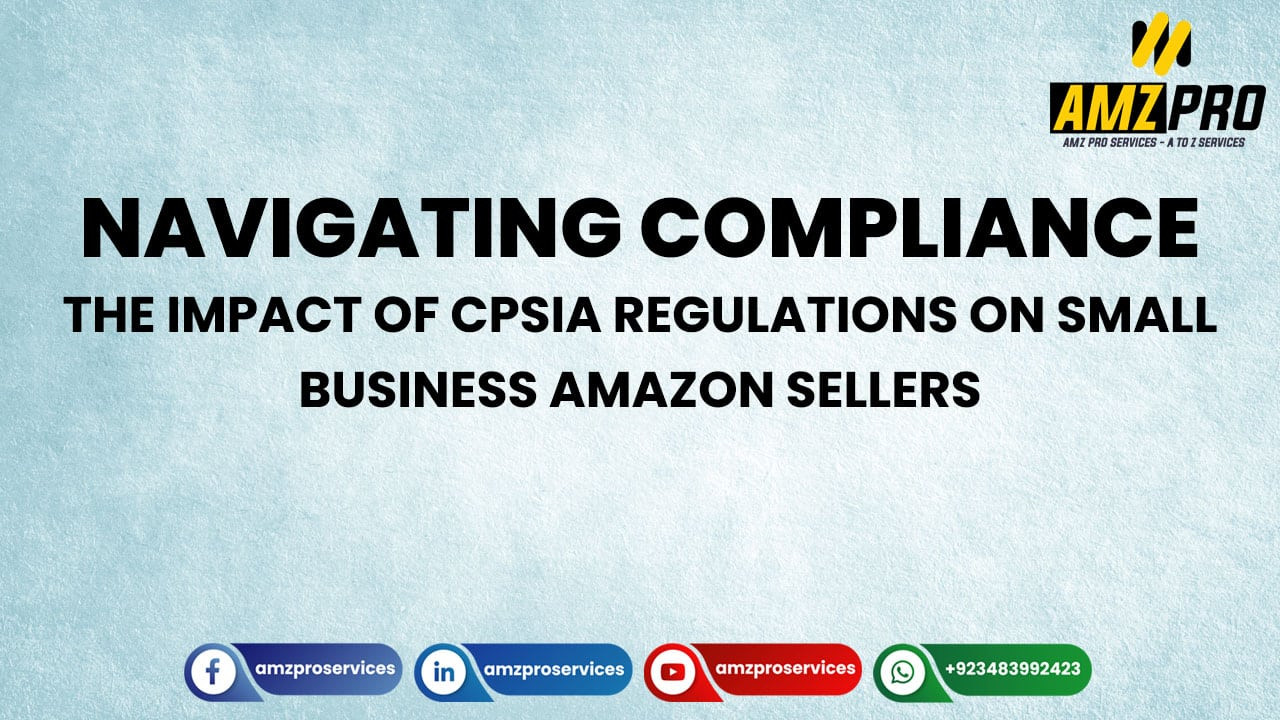The impact of CPSIA regulations on small business Amazon sellers
The impact of CPSIA regulations on small business Amazon sellers
Amazon is the largest online retailer in the world, and as a result, it is a popular platform for sellers of all sizes. However, selling on Amazon comes with its own unique set of challenges, particularly when it comes to product compliance. Non-compliant products can lead to negative reviews, returns, and even legal action, all of which can have a significant impact on a seller's bottom line. In this blog post, we will explore some common Amazon product compliance issues and provide tips on how to avoid them for increased sales.
Product Safety Compliance
One of the most important product compliance issues for Amazon sellers to be aware of is product safety compliance. Products sold on Amazon must comply with all relevant safety standards, including the Consumer Product Safety Improvement Act (CPSIA) and the Federal Trade Commission (FTC) guidelines. Failure to comply with safety standards can result in costly fines, product recalls, and even legal action.
To avoid product safety compliance issues, Amazon sellers should prioritize product safety by:
- Conducting appropriate safety testing: Sellers should test their products to ensure they comply with all relevant safety standards, such as CPSIA and FTC guidelines.
- Obtaining a Children's Product Certificate (CPC): If selling children's products, sellers must obtain a CPC to certify that their product meets all applicable safety standards.
- Displaying compliance information: Sellers should display compliance information on their product listings, including the CPC or language that demonstrates compliance.
- Staying up-to-date with regulations: Regulations can change, so sellers should stay up-to-date with changes and ensure their products remain compliant with all applicable standards.
Intellectual Property Infringement
Intellectual property infringement is another common product compliance issue for Amazon sellers. This can occur when sellers use images, product descriptions, or brand names that are owned by someone else without permission. Intellectual property infringement can result in legal action, product delisting, and negative reviews.
To avoid intellectual property infringement issues, Amazon sellers should:
- Conduct thorough research: Sellers should conduct thorough research to ensure they are not infringing on anyone else's intellectual property rights before listing their products on Amazon.
- Obtain permission: If sellers want to use images, product descriptions, or brand names that are owned by someone else, they should obtain permission before doing so.
- Monitor listings: Sellers should monitor their listings and remove any infringing content immediately if they become aware of it.
Restricted Products
Amazon has restrictions on certain products, such as hazardous materials, prescription drugs, and weapons. If a seller lists a restricted product, it can result in legal action, fines, and account suspension.
To avoid restricted product compliance issues, Amazon sellers should:
- Familiarize themselves with Amazon's restricted product list: Sellers should familiarize themselves with Amazon's restricted product list and ensure they are not selling any restricted products.
- Check local laws: Even if a product is not on Amazon's restricted list, it may be restricted by local laws. Sellers should check local laws to ensure they are not selling any restricted products.
- Obtain necessary permits and licenses: If selling a product that requires a permit or license, sellers should obtain the necessary permits and licenses before listing the product on Amazon.
Counterfeit Products
Counterfeit products are a major problem on Amazon, and selling counterfeit products can result in legal action, account suspension, and negative reviews.
To avoid counterfeit product compliance issues, Amazon sellers should:
- Source products from reputable suppliers: Sellers should source products from reputable suppliers and avoid suppliers that sell counterfeit products.
- Monitor listings: Sellers should monitor their listings and remove any counterfeit products immediately if they become aware of them.
Register for Amazon's
- Brand Registry: Amazon's Brand Registry allows brand owners to protect their intellectual property rights and monitor listings for counterfeit products.
Listing Inaccuracies
Inaccurate listings can result in negative reviews, returns, and decreased sales. Common listing inaccuracies include incorrect product descriptions, images, and pricing.
To avoid listing inaccuracy issues, Amazon sellers should:
- Ensure accurate product descriptions: Sellers should ensure that their product descriptions are accurate and include all relevant information.
- Use high-quality images: Sellers should use high-quality images that accurately depict their products.
- Monitor pricing: Sellers should monitor their pricing to ensure it is accurate and competitive.
Product Reviews and Ratings
Product reviews and ratings are critical to success on Amazon, but they can also be a compliance issue. Amazon has strict guidelines regarding product reviews and ratings, and failure to comply with these guidelines can result in account suspension and legal action.
To avoid product review and rating compliance issues, Amazon sellers should:
- Avoid incentivized reviews: Amazon prohibits incentivized reviews, such as offering free products in exchange for reviews.
- Do not manipulate reviews: Sellers should not manipulate reviews or ratings by creating fake accounts or paying for reviews.
- Monitor reviews: Sellers should monitor their reviews and address any negative reviews promptly.
Conclusion
Product compliance is critical for success on Amazon, and failure to comply with regulations can result in negative reviews, returns, legal action, and decreased sales. Amazon sellers can avoid product compliance issues by prioritizing product safety, avoiding intellectual property infringement, complying with restricted product guidelines, avoiding counterfeit products, ensuring accurate listings, and following Amazon's guidelines for product reviews and ratings. By prioritizing compliance, Amazon sellers can build consumer trust and confidence, leading to increased sales and a competitive advantage in the marketplace.

